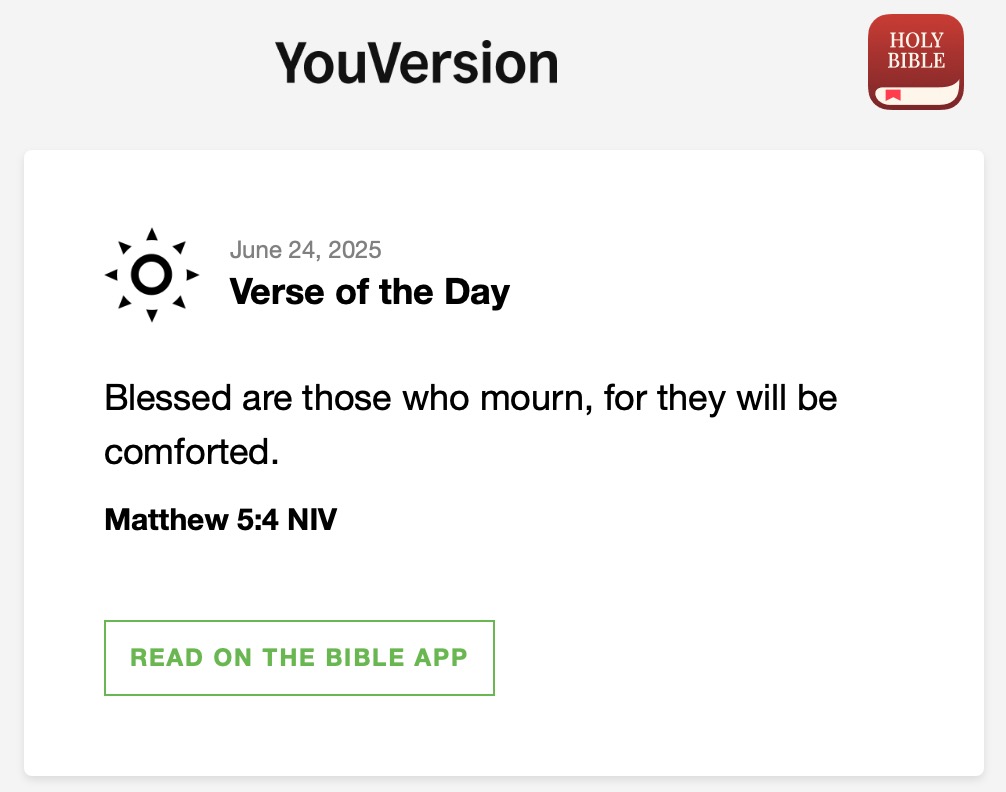Today I received an email from You Version (the Bible App). It struck a chord with me in relation to the recent passing of my own Mum and indeed the passing even more recently of my Best Friend’s Mum.
The second Beatitude, “Blessed are those who mourn, for they will be comforted” (Matthew 5:4, NIV), is a profound paradox that reveals the heart of God’s kingdom. Here’s a deeper exploration of its meaning and implications:
1. The Nature of “Mourning”
- Spiritual Brokenness: This mourning isn’t limited to grief over death or loss. In Jesus’ context, it primarily signifies spiritual anguish—a deep sorrow over sin (personal and collective), the brokenness of the world, and our separation from God (e.g., Psalm 51:17; James 4:8–10).
- Empathy for Suffering: It also includes mourning over injustice, pain, and suffering in creation (Romans 8:22–23). Jesus models this in weeping over Jerusalem (Luke 19:41) and at Lazarus’ tomb (John 11:35).
2. The Promise of Comfort
- Divine Encounter: The “comfort” is God’s personal response. Isaiah 61:1–3 (quoted by Jesus in Luke 4:18) depicts God binding up the brokenhearted and bestowing “beauty for ashes.”
- The Holy Spirit: Jesus calls the Spirit the “Comforter” (Greek: Paraklētos, John 14:16), who consoles, strengthens, and intercedes for us (Romans 8:26).
- Ultimate Restoration: Comfort culminates in Christ’s return, where God “will wipe every tear from their eyes” (Revelation 21:4).
3. Why Are Mourners “Blessed”?
- Kingdom Perspective: Mourning acknowledges reality—sin and suffering exist—but refuses to despair. It invites God’s intervention.
- Transformation: Like a plowed field, a broken heart is fertile ground for repentance, healing, and growth (Psalm 34:18; 2 Corinthians 7:10).
- Community: Those who mourn enter solidarity with others in grief, embodying Christ’s love (2 Corinthians 1:3–4).
4. Contrast with Worldly Values
- Culture often avoids mourning, numbing pain with distractions. Jesus elevates it as sacred.
- True comfort is found not in avoidance but in surrender to God.
5. Living This Beatitude Today
- Personal Response:
- Embrace repentance: Mourn sin without shame, trusting God’s forgiveness (1 John 1:9).
- Lament honestly: Bring grief, doubt, and anger to God (see the Psalms).
- Corporate Response:
- Weep with those who weep (Romans 12:15).
- Pursue justice: Mourn oppression and act (Isaiah 58:6–7).
In essence: Jesus declares that those courageous enough to face the world’s darkness—and their own—will encounter God’s intimate comfort now and the hope of eternal restoration. This mourning is not despair but faith in action, trusting that God meets us in the valley (Psalm 23:4).
“The sacrifices of God are a broken spirit; a broken and contrite heart, O God, you will not despise.”
—Psalm 51:17

